Journaling, Supplements, and Therapy: A Trio for Self-Understanding in BPD
Introduction 🌿
Living with Borderline Personality Disorder (BPD) often feels like navigating life without a clear roadmap. Intense emotions, shifting identities, impulsive behaviors, and constant fear of abandonment can make it difficult to feel grounded. But self-understanding—the ability to know and accept your inner world—is a crucial step toward stability and healing.
Three powerful tools can help you build this self-understanding: journaling ✍️, supplements 💊, and therapy 🛋️. Each works in a different way:
Journaling helps you explore thoughts and emotions directly.
Supplements provide biological stability, calming the body so reflection is possible.
Therapy gives structure, guidance, and deeper insight into your patterns.
When woven together, these practices create a trio of healing—one that fosters self-awareness, emotional regulation, and resilience.
Looking for supplements for people with BPD? Click here.
Why Self-Understanding Matters in BPD 💜
Self-understanding is more than “knowing yourself.” For people with BPD, it’s a path to:
Recognizing triggers before they spiral into crises.
Reducing shame by connecting behaviors to underlying emotions.
Building emotional language to communicate more effectively.
Strengthening identity in the face of confusion or emptiness.
Empowering therapy by integrating skills outside of sessions.
Without self-understanding, emotions can feel random and uncontrollable. With it, you start to see patterns—and patterns can be changed.
Part I: Journaling as a Mirror of the Self ✍️
Why Journaling Helps in BPD
Journaling provides a safe space to untangle thoughts and emotions. Instead of letting them whirl inside your mind, you put them onto paper where they can be observed, analyzed, and soothed.
Types of Journaling for BPD
Free Writing 🌀
Write continuously without censoring.
Good for processing overwhelming emotions.
DBT Diary Card 📋
Track emotions, urges, and skills used daily.
Provides structure and accountability.
CBT Thought Record 🧠
Record situation → thoughts → feelings → behaviors.
Challenge distorted thinking patterns.
Gratitude Journal 🌸
Write 3 things you’re grateful for daily.
Shifts focus away from negativity.
Self-Compassion Journal 💜
Replace self-criticism with supportive statements.
Example: Instead of “I failed again,” write “I tried, and I’m learning.”
Trigger Log ⚡
Write down what triggered emotional spirals.
Over time, patterns emerge.
Journaling Prompts for Self-Understanding
What emotion am I feeling right now?
What triggered this emotion?
What belief about myself is underneath this feeling?
What would I say to a friend in my position?
What do I need most in this moment?
Part II: Supplements for Emotional Balance 💊

Supplements support journaling and therapy by stabilizing the brain and nervous system. When your body is calmer, self-reflection becomes easier.
Core Supplements for BPD
Omega-3 Fatty Acids 🐟
Improve brain plasticity.
Reduce impulsivity and aggression.
Support mood stability.
Magnesium 🌌
Calms the nervous system.
Improves sleep quality.
Reduces anxiety and muscle tension.
L-Theanine 🍵
Promotes calm focus.
Great for pre-therapy journaling sessions.
Ashwagandha 🌱
Lowers cortisol.
Reduces irritability and chronic stress.
Probiotics & Prebiotics 🦠
Improve gut-brain communication.
Reduce inflammation that worsens mood swings.
Vitamin D ☀️
Essential for serotonin balance.
Helps regulate circadian rhythm.
Zinc ⚖️
Supports dopamine regulation.
Reduces impulsive behaviors.
How Supplements Support Self-Understanding
Magnesium makes it easier to journal at night by calming the mind.
L-theanine improves focus during therapy reflection.
Omega-3s enhance therapy outcomes by improving brain flexibility.
Looking for supplements for people with BPD? Click here.
Part III: Therapy as a Guide 🛋️

Therapy is the anchor of the trio, providing the framework and tools for self-understanding.
Types of Therapy for BPD
DBT (Dialectical Behavior Therapy) 💬
Skills: mindfulness, emotion regulation, distress tolerance, interpersonal effectiveness.
Journaling and supplements reinforce DBT practices.
CBT (Cognitive Behavioral Therapy) 🧠
Identifies cognitive distortions.
Journaling helps track thought patterns.
EMDR (Eye Movement Desensitization & Reprocessing) 🌀
Processes trauma memories.
Supplements like magnesium lower anxiety during sessions.
Schema Therapy 🪞
Targets deep-rooted beliefs (“I am unlovable”).
Journaling supports schema awareness.
MBT (Mentalization-Based Therapy) 🤔
Improves understanding of one’s own and others’ mental states.
Journaling helps practice perspective-taking.
How Therapy Strengthens Self-Understanding
Provides external feedback.
Prevents self-reflection from turning into self-criticism.
Helps integrate insights from journaling and supplements into daily life.
Looking for online therapy for people with BPD? Click Here.
Part IV: Weaving the Trio Together 🌈
A Morning Routine 🌞
Supplements: Omega-3, Vitamin D, Probiotic.
Journaling: Write an intention for the day.
Therapy Skills: Practice DBT mindfulness for 5 minutes.
An Afternoon Reset 🌿
Supplements: L-theanine if stressed.
Journaling: Record any triggers.
Therapy Skills: Use STOP skill before reacting.
An Evening Ritual 🌙
Supplements: Magnesium, Ashwagandha, Glycine.
Journaling: Gratitude + self-compassion entries.
Therapy Skills: Reflect on what went well today.
Part V: Crisis Toolkit ⚡
When self-understanding breaks down, a crisis toolkit helps you recover:
Breathwork 🌬️: Box Breathing or 4-7-8 Breathing. Want to try Breathwork? Click Here.
Supplements 💊: Magnesium or L-theanine for fast calm.
Journaling ✍️: Write one sentence: “This will pass.”
Therapy Skills 🛋️: Use DBT TIP skill.
Case Studies 👩👨
Case 1: Anna 🌸
Struggled with self-criticism.
Used journaling + magnesium at night.
Learned to approach her emotions with compassion.
Case 2: Daniel ⚡
Battled impulsivity in relationships.
Used Omega-3s, DBT diary cards, and therapy check-ins.
Built more stable connections.
Case 3: Maria 🌙
Felt empty and directionless.
Began probiotics + gratitude journaling.
Reported more self-trust and hope.
Challenges & Tips ⚠️
Overwhelm: Start with one practice at a time.
Consistency: Anchor journaling and supplements to meals or bedtime.
Triggers: If journaling leads to spiraling, limit to structured prompts.
Patience: Self-understanding takes months of steady practice.
Long-Term Benefits 🌈
With time, the trio of journaling, supplements, and therapy helps:
Reduce emotional reactivity ⚖️
Strengthen identity 🌱
Improve therapy progress 🛋️
Build emotional language 🧠
Increase self-compassion 💜
Create stability in daily life 🌞🌙
Conclusion 💜
Self-understanding in BPD is not just about “figuring yourself out”—it’s about building daily habits that ground, stabilize, and empower you.
Journaling gives voice to your emotions.
Supplements provide biological stability.
Therapy offers guidance and skills.
Together, they form a trio for healing, helping you move from chaos to clarity, from self-criticism to compassion, and from instability to resilience. 🌿✨
References 📚
Linehan, M. M. (2014). DBT Skills Training Manual. Guilford Press.
Porges, S. W. (2011). The Polyvagal Theory. Norton.
Shapiro, F. (2018). EMDR Therapy. Guilford Press.
Young, J., Klosko, J., & Weishaar, M. (2003). Schema Therapy: A Practitioner’s Guide.
Parker, G., et al. (2015). “Omega-3 supplementation and borderline personality disorder.” Psychiatry Research.
Murao, E., & Shimizu, E. (2021). “Magnesium in psychiatric disorders.” Nutrients.
Jerath, R., et al. (2015). “Physiology of long pranayamic breathing.” Medical Hypotheses.
Neff, K. (2011). Self-Compassion. HarperCollins.
Related Posts
-

How to Measure Your Emotional Growth Over Time
Emotional growth can’t be measured on a scale — but it can be tracked through awareness, regulation, and reflection. Learn how to monitor your emotional evolution using journaling, biofeedback, and science-backed metrics for real progress. 💫
-

The Connection Between Creativity and Resilience
Creativity and resilience share the same roots — adaptability, flexibility, and imagination. Learn how creative expression rewires your brain for strength, helping you transform stress into growth through neuroscience, art, and self-reflection. 🌿
-

Why Cycling Supplements May Improve Long-Term Resilience
Your body adapts to everything — even supplements. Discover why cycling your supplements helps prevent tolerance, boost energy naturally, and build lasting resilience by aligning with your body’s biological rhythms. 🌿
-

The Role of Biofeedback in Emotional Strength
Learn how biofeedback bridges mind and body — helping you monitor heart rate, breath, and brain activity to build emotional strength, resilience, and calm under pressure. See how science meets mindfulness for lasting control. 🌿
-

How to Stay Strong During Long-Term Stress
Long-term stress doesn’t just drain your energy — it rewires your biology. Discover science-backed ways to strengthen your body, balance your mind, and build lasting resilience through breathwork, nutrition, mindset shifts, and supplements that restore calm and focus. 💪
-

Resilience Training for Entrepreneurs
Entrepreneurship isn’t just about strategy — it’s about stamina. Discover how resilience training helps founders stay calm, clear-headed, and adaptable under pressure through neuroscience-backed habits, emotional regulation, and smart supplementation. 🌿
-

How Nootropics Can Boost Emotional Control
Emotions don’t have to control you. Discover how nootropics like L-theanine, ashwagandha, saffron, and omega-3s help balance brain chemistry, improve focus, and strengthen your ability to stay calm and composed under stress. 🌿
-

Stacking Adaptogens for Maximum Resilience
Adaptogens are nature’s stress shield — helping you stay calm, energized, and clear even under pressure. Learn how to stack herbs like ashwagandha, rhodiola, reishi, and schisandra for maximum resilience, balance, and long-term vitality. 🌿
-
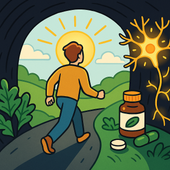
Post-Traumatic Growth and Supplements That Support It
After trauma, true healing means more than survival — it’s transformation. Learn how post-traumatic growth happens in the brain and body, and explore natural supplements like magnesium, ashwagandha, saffron, and omega-3s that support resilience, clarity, and emotional repair.
-

How to Regain Focus After Emotional Stress
After emotional stress, your nervous system feels frayed — your focus fades, thoughts race, and calm seems impossible. Learn how to restore balance, rebuild concentration, and retrain your brain for clarity and peace through evidence-based mind–body tools. 🌿
-
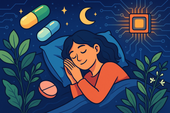
The Future of Sleep Supplements
The future of sleep supplements is here — where science meets nature. Discover how next-generation formulas use adaptogens, amino acids, and biotech innovations to support deep, restorative sleep without dependency. 🌙
-
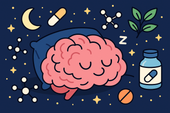
Emerging Research on Sleep and Nootropics
Can nootropics help you sleep better? Discover how compounds like L-theanine, magnesium threonate, ashwagandha, and Alpha-GPC influence neurotransmitters, circadian rhythm, and brain recovery — bridging the gap between smarter days and deeper nights. 🌙
-

New Herbal Extracts for Deep Sleep
Discover the next generation of herbal extracts for deep sleep — from saffron and magnolia to jujube and lemon balm. Learn how these plant-based compounds calm the nervous system, balance cortisol, and promote truly restorative rest. 🌙
-

Sleep Biohacking: What Works and What Doesn’t
Biohacking your sleep can sound futuristic — from red light therapy to wearables and supplement stacks. But which hacks actually help, and which are just hype? Discover the science-backed sleep strategies that truly improve rest, recovery, and brain health. 🌙
-
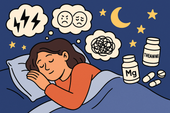
Sleep Support for People with Anxiety Disorders
💭 A restless mind can keep you up all night — thoughts spinning, heart racing, and peace feeling far away. Learn how to quiet overthinking, regulate your nervous system, and create a nightly ritual that teaches your brain to let go and rest deeply. 🌙
-

How to Fall Back Asleep After Waking Up
Waking up in the middle of the night? Learn how to fall back asleep quickly and calmly using breathing techniques, stress-reducing rituals, and natural supplements like magnesium and glycine. Restore your body’s rhythm and wake up feeling refreshed.
-
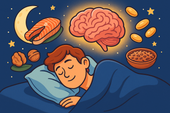
The Role of Omega-3s in Sleep Quality
-
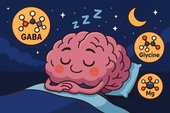
Stacking GABA and Glycine for Deeper Rest
Discover how stacking GABA and glycine can help you achieve deeper, more restorative sleep. Learn how these calming amino acids work together to relax your mind, soothe your body, and improve overall sleep quality—naturally and safely.
-

Overcoming Jet Lag with Supplements
✈️ Jet lag doesn’t have to ruin your trip! Discover how supplements like melatonin, magnesium, L-theanine, and tart cherry can help you reset your body clock faster, reduce fatigue, and recover energy naturally after long flights. 🌙
-

Managing Sleep During Times of Stress
Feeling wired and restless? Learn how to manage sleep during stressful times through nutrition, breathwork, and natural supplements like magnesium and L-theanine. Discover how to calm your nervous system and restore deep, peaceful rest—even when life feels overwhelming.
-

The Role of Magnesium for Night Cramps
Night cramps keeping you awake? Discover how magnesium helps relax muscles, balance electrolytes, and prevent painful spasms. Learn which forms work best, how to take them, and how to pair them with other nutrients for cramp-free, peaceful sleep.
-

Supplements That Reduce Nighttime Awakenings
🌙 Discover science-backed supplements that help you stay asleep through the night. From magnesium and L-theanine to glycine and ashwagandha, learn how these natural compounds calm your nervous system, balance cortisol, and prevent 2 a.m. wake-ups for deeper, more restorative rest.
-

Nootropics That Promote Calm and Rest
Explore the world of calming nootropics — natural brain enhancers that promote relaxation, better focus, and deeper rest. Learn how L-Theanine, magnesium, ashwagandha, and other adaptogens help balance your nervous system, reduce stress, and support restorative sleep.
-

Best Natural Supplement Stack for Sleep
Discover the best natural supplement stack for deep, restorative sleep. Learn how nutrients like magnesium, L-theanine, glycine, and calming herbs such as chamomile and ashwagandha work together to relax your body, calm your mind, and improve sleep quality—naturally and safely.
-

Combining L-Theanine and Magnesium for Sleep: A Calm Night, Naturally
Discover how combining L-Theanine and Magnesium can help you drift into deep, restorative sleep. Learn how this natural duo calms the mind, relaxes the body, and supports your nervous system—without grogginess the next morning.
-

How to Sleep Better After Intense Workouts
Struggling to fall asleep after a tough workout? Learn how to optimize your post-training recovery with nutrition, hydration, and science-backed sleep strategies. Discover how to calm your nervous system, balance hormones, and wake up fully recharged for your next session.
-

Ashwagandha and Valerian: A Bedtime Combo for Deep Rest and Emotional Reset
Discover the calming synergy of Ashwagandha and Valerian root, two natural sleep aids that help quiet the mind, ease anxiety, and promote deeper rest. Learn how this herbal duo supports the nervous system, balances stress hormones, and restores emotional peace — without next-day grogginess.
-

How to Create a Resilience-Boosting Diet
Discover how to build emotional and physical strength from the inside out with a resilience-boosting diet 🍎. Learn which foods stabilize your mood, how supplements like magnesium and omega-3s strengthen your stress response, and why pairing nutrition with breathwork and therapy creates lasting calm, focus, and vitality 🌿💪.
-

Best Teas and Herbal Blends for Calmness: Nature’s Way to Restore Inner Peace
Ashwagandha, the ancient adaptogenic herb, helps your body find balance during stress. Known as “Indian ginseng,” it supports cortisol regulation, boosts energy, and restores calm clarity. Discover how this powerful root promotes resilience, emotional balance, and steady vitality — one cup at a time. 🌸
-

Parenting and Emotional Strength: How to Raise Children Without Losing Yourself
Empathy is the bridge that connects hearts — the quiet power to understand, feel, and support another’s emotions without judgment. Learn how empathy strengthens relationships, enhances communication, and cultivates deeper compassion in everyday life. 🌿
-

How to Bounce Back from Public Failure: Reclaiming Confidence, Purpose, and Power
Visualization is more than imagination — it’s brain training for resilience. By picturing calm, success, or healing, you activate the same neural pathways as real experience. Learn how daily visualization rewires your brain for confidence, emotional balance, and recovery from stress. ✨
-

Coping with Financial Stress Through Resilience: How to Stay Grounded When Money Feels Tight
Body awareness is the foundation of emotional resilience. By tuning into your body’s signals — tension, fatigue, or calm — you learn to recognize stress before it overwhelms you. Discover how mindfulness, gentle movement, and breathwork can deepen your connection with your body and restore balance from the inside out. 🧘
-

How to Stay Positive During Chronic Illness: A Guide to Emotional Strength and Hope
Creativity is more than art — it’s a form of healing. Whether through painting, writing, music, or small acts of expression, creativity helps release emotion, calm the nervous system, and reconnect you to joy. Discover how to use creativity as a tool for emotional balance, resilience, and self-discovery. 🌿
-

Resilience Tips for Caregivers: How to Stay Strong While Caring for Others
Joy isn’t the absence of pain — it’s the quiet strength to find light even in challenging times. Cultivating joy through small daily moments restores balance, releases stress, and reminds you of life’s beauty. Learn how to reconnect with authentic happiness, rebuild emotional energy, and nurture your nervous system through gratitude, presence, and play. 🌿
-

Building Resilience After a Breakup: How to Heal, Rebuild, and Rise Stronger
Social connection is one of the strongest predictors of emotional resilience. During difficult times, genuine relationships act as anchors — calming the nervous system, reducing stress hormones, and helping you regain perspective. Learn how cultivating real human connection can strengthen your mind, heart, and overall well-being. 🌿
-

How to Stay Emotionally Strong During Job Loss
Your emotions are powered by brain chemistry — a delicate balance of neurotransmitters like serotonin, dopamine, and cortisol. When these chemicals work in harmony, you feel calm, focused, and resilient. Learn how daily habits, nutrition, and mindfulness can support your brain chemistry and boost emotional well-being naturally. 🌿
-

The Role of Hormones in Emotional Stability: How Your Chemistry Shapes Your Calm
Hormones shape more than your body — they shape your emotions, resilience, and sense of calm. From cortisol to serotonin, these chemical messengers influence how you react to stress, connect with others, and recover from challenges. Learn how to balance your hormones naturally to build lasting emotional stability and harmony within. 💫
-

Mitochondria and Emotional Energy: The Cellular Power Behind Your Mood
Breathwork is one of the most powerful tools for emotional regulation and cellular balance. Through intentional breathing, you can calm your nervous system, increase oxygen flow to the brain, and even support mitochondrial energy. Learn how conscious breathing connects body and mind — transforming stress into presence and emotional strength. 🌿
-

Inflammation and Its Impact on Mood Resilience: The Silent Link Between Body and Mind
Inflammation doesn’t just affect the body — it impacts the mind. Chronic inflammation alters brain chemistry, depletes serotonin, and makes emotional recovery harder. Learn how calming inflammation through nutrition, mindfulness, and sleep can restore balance, resilience, and a renewed sense of emotional strength. 💫
-

How Antioxidants Protect Emotional Well-being: The Hidden Link Between Oxidative Stress and Mental Health
Antioxidants do more than protect your body — they defend your mind. By neutralizing oxidative stress, antioxidants support serotonin, dopamine, and brain energy pathways that keep you calm, focused, and emotionally balanced. Discover how foods like berries, green tea, and dark chocolate nourish your brain, boost mood, and strengthen resilience from the inside out. 🌿✨
-

The HPA Axis and Emotional Health: The Hidden Bridge Between Stress and Mind
Neuroplasticity — the brain’s ability to rewire and adapt — is the foundation of emotional healing and resilience. When you face stress, trauma, or change, your neural pathways can reshape themselves to support new patterns of calm, focus, and self-awareness. Learn how daily practices like mindfulness, therapy, and breathwork strengthen neuroplasticity to transform emotional pain into personal growth. 🌸
-

Why Cortisol Control Is Key to Resilience: Mastering Stress to Build Emotional Strength
Controlling cortisol — the body’s main stress hormone — is the secret to lasting resilience. When cortisol levels stay balanced, your mind becomes clearer, emotions steadier, and energy more sustainable. Learn how breathwork, mindset shifts, adaptogens, and daily rhythms can help you calm your stress response and build true inner strength. 🌞💪
-

Dopamine’s Influence on Motivation and Recovery: Reigniting Drive and Balance
Healthy relationships are the foundation of emotional balance and resilience. Whether romantic, familial, or platonic, genuine connection releases dopamine, serotonin, and oxytocin — the brain’s “bonding trio” — helping us feel secure, motivated, and seen. Learn how trust, empathy, and communication not only strengthen your connections but also reshape your nervous system for deeper emotional well-being. 🌿🤝
-

The Role of Serotonin in Resilience: How This “Mood Molecule” Shapes Emotional Strength
Serotonin — often called the “resilience molecule” — plays a vital role in how we handle stress, regulate mood, and recover from emotional challenges. Beyond happiness, this powerful neurotransmitter helps balance the gut-brain axis, stabilize the nervous system, and support emotional flexibility. Learn how nutrition, sunlight, mindfulness, and adaptogens can naturally boost serotonin and strengthen your emotional resilience. 🌞🧠
-

How Neuroplasticity Supports Emotional Growth: Rewiring the Brain for Resilience
Neuroplasticity is the brain’s built-in power to grow, adapt, and heal — and it’s the foundation of emotional transformation. Every mindful breath, compassionate act, or reframed thought strengthens new neural pathways that support resilience and self-awareness. Learn how your brain rewires through daily habits, helping you turn emotional challenges into opportunities for growth and calm. 🌿
-

Tai Chi and Adaptogens for Mind-Body Balance: The Art of Harmonizing Energy and Resilience
Alchemy isn’t just an ancient science — it’s a timeless symbol of transformation and inner balance. By blending the physical and spiritual, alchemy teaches us that change begins from within. Just as metals are refined into gold, we too can transmute emotional pain, stress, and chaos into clarity and strength through mindful practice and self-awareness. 🌙✨
-

Cold Therapy and Emotional Control: Training the Mind Through the Body
Cold therapy isn’t just for athletes — it’s a tool for emotional mastery. By exposing your body to controlled cold, you train your nervous system to stay calm under stress, improving focus, mood, and resilience. This article explores the science of cold exposure, its impact on hormones and the vagus nerve, and how ice baths and cold showers can help you build emotional control, one breath at a time. 🧊🧘♂️
-

How Music Influences Emotional Recovery: The Healing Soundtrack of the Mind
Neuroplasticity — the brain’s ability to rewire and heal itself — is at the heart of emotional recovery. Through mindful habits, music, therapy, and consistent mental stimulation, your brain can form new connections that support resilience and well-being. Discover how neuroplasticity turns pain into growth, helping you rebuild balance, focus, and emotional strength. 🌿
-

Nature Therapy for Building Resilience: Reconnecting With the Healing Power of the Earth
Nature therapy helps rebuild emotional resilience by reconnecting you with the healing rhythms of the Earth. From forest walks to sunlight exposure, nature restores balance to your nervous system, lowers stress hormones, and teaches emotional adaptability. Learn how spending time outdoors can enhance mental clarity, calm anxiety, and awaken your natural capacity to heal. 🌞
-

Breathwork Techniques That Pair with Supplements: The Ultimate Synergy for Stress Relief and Mental Clarity
Breathwork and supplements create a powerful mind-body synergy for stress relief, focus, and energy. By combining intentional breathing with adaptogens, nootropics, and calming nutrients, you can naturally regulate cortisol, sharpen mental clarity, and boost emotional balance. This guide explores the best breathwork techniques and supplement pairings to help you feel centered, calm, and energized from the inside out. 🌿


















































